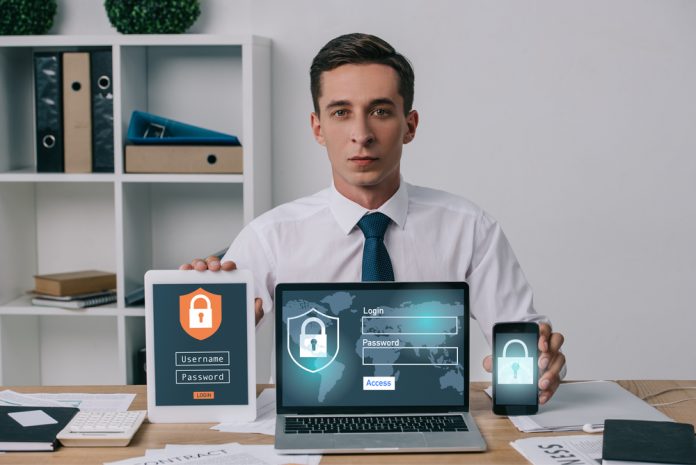Freelancers need to be their own IT expert (and marketer, salesperson, accountant). Here’s how to protect yourself from the most common online threats.
What Makes You Vulnerable?
Public Wi-Fi Networks
Convenient? Yes. Safe? No. A hacker only needs the network password to get access to your browser history, device, or accounts. Public Wi-Fi networks are so unsafe that most security experts will tell you to avoid them completely. That’s impossible for a freelancer, so you need to know how to stay safe at your coworking, local cafe, or airport.
Your Devices
Your devices store an incredible amount of personal information about you. Making sure they’re protected should be paramount. If your computer, phone, or tablet is left unsecured a hacker can easily use it to access your accounts. An unsecured device leaves you vulnerable to financial theft, identity theft, and more.
Insecure Mobile Apps
When you install an app you give it permission to control and access your device. If your app is built on insecure software, hosts ads, or keeps your data on unencrypted databases you are leaving yourself open to a world of problems.
Unsecured Financial Transactions
If you freelance you probably get paid by wire transfer, PayPal, cryptocurrency, or some other online payment method. You need to make sure those transactions are secured at all times.
Unsafe Web Pages
Visiting or interacting with unencrypted web pages – particularly online shops – is a surefire way to have your payment details stolen. Unsecured websites are also common hideouts for malware.
Malware, Viruses and Ransomware
Malware is a catchall term for malicious software that infects your computer or device and alters the way it functions. Viruses are designed to multiply and infect any device or network it comes into contact with. Ransomware is designed to lock down your device until a payment (a ransom) is made.
Phishing Emails
Phishing emails are most of the common scams around. A phishing email usually pretends to come from a source you trust (such as your bank or email provider). WIth various techniques, a phishing email tricks you into revealing your personal information, such as your password.
What You Can Do to Protect Yourself
Always Update Your Devices
If you’re a freelancer your devices are your most important tool. It might be inconvenient but you should always install updates as soon as possible. Security vulnerabilities are fixed with each new update. Some of the most common malware is designed to take advantage of outdated systems and software.
Use a VPN
A virtual private network (VPN) should be the first point of call for any freelancer or digital nomad. It’s an application that encrypts your traffic and changes your IP address.
That means you can use public Wi-Fi networks without worrying about hackers spying on your online activity or stealing your information. You can also use a VPN to change your displayed location. That means you can bypass censorship restrictions or watch streaming services locked to a particular region. For example, you can watch US Netflix outside the United States or Hotstar from outside India.
You can install a VPN app on all your devices. There are lots of VPN providers but the most important features to look for in a VPN are speed, strong encryption, and lots of location choices. Better VPNs charge a monthly subscription fee but if you’re really savvy there is a way to get a premium service without the fee.
Use a Password Manager
We all keep track of a huge number of passwords. Using the same password for more than one account or using a generic or easy to guess password is a huge security faux pas. The only way to keep your accounts secure is to use a complex and unique password for each one of your accounts.
A password manager is an app and a browser extension that does the heavy lifting for you. It generates and stores complex passwords automatically for every new account. When you need access, a password manager will input the password on command.
Beef Up Your Encryption
If you’re a freelancer, you probably use a cloud storage service like Google Drive or Dropbox to keep your files on hand when you need them and safe when you don’t. Both companies (and all reputable cloud services) encrypt your files automatically. However, if you store very sensitive information (like financial details) you should really add an additional layer of encryption.
No system is 100% secure. If your cloud storage is breached, which is not unheard of, additional encryption means your files will stay private.
There are lots of high quality, and free, tools that can encrypt your files before you upload them to the cloud. They are called client-side encryption tools. Cryptomator is an open-source and well rated example. It’s free on Linux, Mac and Windows, but you need to pay a small fee to use it on mobile devices.
Be Smart About Apps
Get into the habit of thinking twice before you install an app; some third party apps can cause problems. First of all, the set of permissions you must agree to can cause some privacy issues. While apps need some information to function, the least amount of information you share with a third party app, the better.
In addition, Malware often hides in apps that are vulnerable to security flaws because of design failures or malicious intent. Just as with cloud service, there is no 100% fool-proof here, but it helps to read reviews before you download and to only install apps from a source you trust.
Use an Antivirus
Antivirus software detects and removes viruses, malware, and other malicious software from your devices. You can get an antivirus as a separate software or get it as part of a VPN package.
Find a Home-Based Business to Start-Up >>> Hundreds of Business Listings.

















































